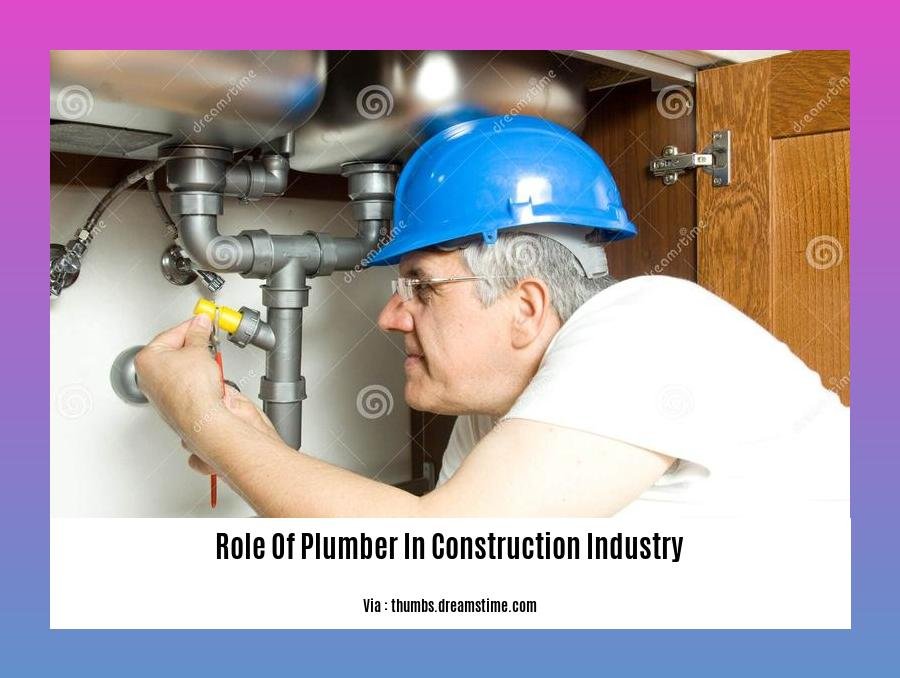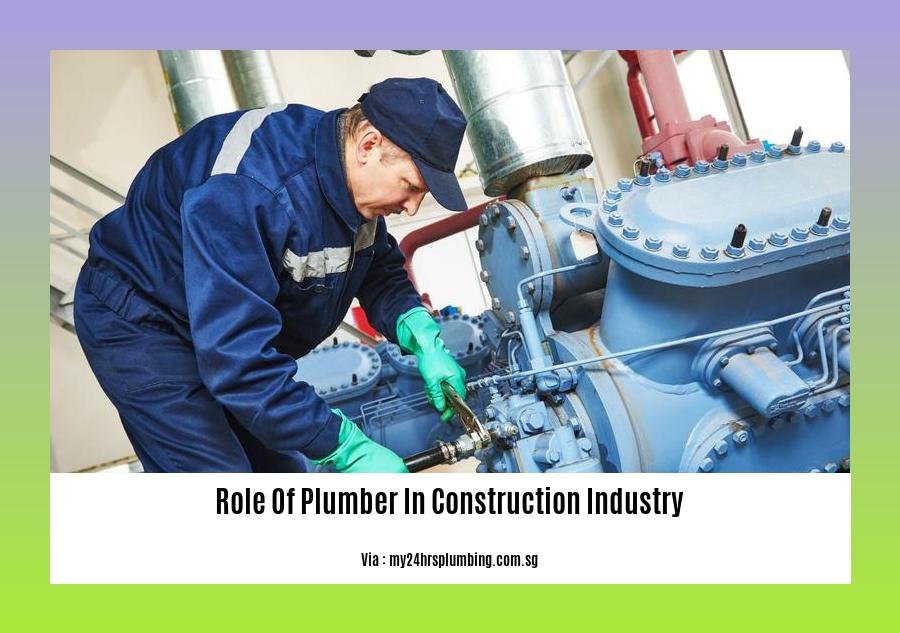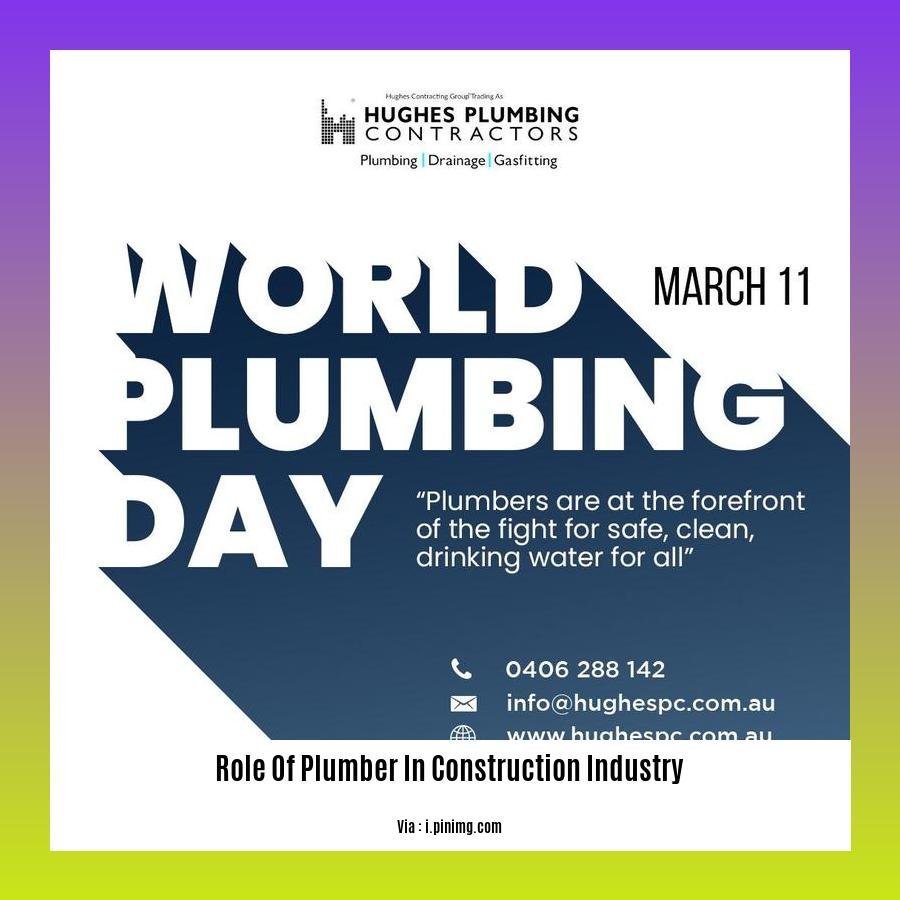–
Key Takeaways:
- Site Planning and Preparation: Map utilities for construction planning.
- Rough-In Piping and Systems: Install supply and waste pipes as per plans.
- Fixture and Appliance Hookups: Connect fixtures and appliances to plumbing systems.
- Finish Plumbing and Inspections: Complete plumbing systems and ensure code compliance.
- Renovations and Service Calls: Repair and update existing plumbing systems.
Plumbers’ Importance in Construction:
- Ensure reliable and safe plumbing infrastructure.
- Prevent structural damage from plumbing failures.
- Provide ventilation and drainage for buildings.
Role of Plumber in Construction Industry

Plumbers are indispensable players in the construction industry, ensuring the functionality, safety, and healthiness of our buildings. From the initial planning stages to post-construction maintenance, plumbers are involved in every phase, overseeing various tasks.
Site Planning and Preparation
Before any construction begins, plumbers work alongside architects and engineers to plan the plumbing system’s layout. They determine the location of pipes, fixtures, and other components to optimize efficiency and comply with building codes. This early involvement ensures a well-designed and functional plumbing system that supports the needs of the building’s occupants.
Rough-In Piping and Systems
During the construction phase, plumbers install the “rough-in” plumbing, which includes all the pipes and fixtures that will later be connected to appliances. They ensure proper drainage, water supply, and ventilation by carefully following building plans and adhering to established standards. This phase is crucial for the long-term performance and durability of the plumbing system.
Fixture and Appliance Hookups
Once the rough-in plumbing is complete, plumbers connect fixtures and appliances. They install sinks, toilets, tubs, showers, and other fixtures, ensuring they are properly sealed, leveled, and connected to the water supply and drainage system. Plumbers also hook up appliances like dishwashers, washing machines, and water heaters, ensuring their efficient and safe operation.
Finish Plumbing and Inspections
In the final stages of construction, plumbers complete the plumbing system by adding finishing touches. They install faucets, showerheads, trim, and other decorative elements. They also conduct thorough inspections to verify that the entire system is functioning properly and meets all relevant codes. These inspections ensure the safety and reliability of the plumbing system for years to come.
Renovations and Service Calls
Even after construction is complete, plumbers play a vital role in maintaining the health and functionality of plumbing systems. They respond to service calls to repair leaks, unclog drains, and fix other plumbing issues. They also perform renovations and upgrades, ensuring that plumbing systems keep pace with changing needs and advancements in technology.
In essence, plumbers are masters of the hidden infrastructure that ensures the smooth operation of our homes, offices, and other buildings. Their expertise in plumbing systems is essential for a safe, healthy, and comfortable built environment.
-
Want to know more about the retention period of construction projects? Explore the ultimate guide on retention in construction.
-
Confused about retention in a construction contract? Discover the ABCs of retention clauses in construction contracts here.
-
Seeking a clear understanding of the term “retention” in construction? Head here for an in-depth explanation.
-
Wondering what “retention” signifies in construction? Dive into our comprehensive guide here.
-
Eager to decipher the full form of “ROW” in road construction? Unlock the acronym’s secret here.
-
Curious about the significance of “ROW” in road construction? Delve into the details here.
Specialized Skills and Expertise

As a plumber, your specialized skills and expertise are crucial for ensuring the safety and functionality of plumbing systems in commercial and residential buildings. These skills encompass a wide range of knowledge and abilities that set you apart as a valuable asset in the construction industry.
Key Responsibilities
- Interpreting blueprints and building codes to design and install plumbing systems
- Estimating project costs and providing quotes based on specialized knowledge of plumbing materials and labor
- Communicating effectively with clients, engineers, and other tradespeople to ensure smooth collaboration
- Maintaining tools and equipment to ensure optimal performance and safety
- Complying with all applicable safety regulations to prevent accidents and maintain industry standards
Unique Abilities
Your specialized expertise in plumbing encompasses:
- Troubleshooting and resolving plumbing issues quickly and efficiently
- Directing workers and managing projects to ensure timely and cost-effective completion
- Bidding on jobs and securing contracts based on your proven expertise and reputation
- Planning work schedules and coordinating with other trades to minimize delays and maximize productivity
Key Takeaways:
- Plumbers possess specialized skills and expertise in installing, repairing, and maintaining plumbing systems.
- These skills include interpreting blueprints, estimating costs, troubleshooting issues, and ensuring safety.
- Plumbers play a vital role in ensuring the functionality, efficiency, and safety of plumbing systems in various buildings.
Sources:
- ResumeHead: Plumber: Job Description, Salary, Skills, and Career Outlook
- BuildingMEP: The Role of Plumber in Construction Industry
Maintaining Compliance with Regulations and Standards
To ensure the safety and functionality of plumbing systems, adhering to regulations and standards is crucial. As a seasoned plumbing expert, I’ve witnessed how compliance impacts the construction industry.
Building Codes and Permits
Building codes provide guidelines for the installation, maintenance, and repair of plumbing systems. By following these codes, plumbers ensure that systems meet safety and health standards. Permits are required for plumbing work, and obtaining them demonstrates compliance with code requirements.
Industry Standards
Industry standards complement building codes by providing best practices and technical specifications for plumbing systems. These standards cover various aspects, including:
- Pipe materials and sizing
- Fixture placement
- Drainage and venting systems
Avoiding Penalties and Liabilities
Non-compliance with regulations and standards can result in penalties, fines, and legal liabilities. Plumbers who fail to adhere to codes and standards risk putting occupants at risk and damaging property.
Process for Compliance
Maintaining Compliance involves several steps:
- Familiarizing with relevant codes and standards
- Reviewing project plans and specifications
- Selecting appropriate materials and equipment
- Installing and maintaining systems according to regulations
- Conducting regular inspections and tests
Key Takeaways:
- Maintaining compliance with regulations and standards is essential for ensuring the safety and functionality of plumbing systems.
- Building codes and permits provide guidelines for proper plumbing practices.
- Industry standards offer best practices and technical specifications.
- Non-compliance can lead to penalties, liabilities, and safety hazards.
- Following a structured process helps plumbers achieve and maintain compliance.
References:
- IAPMO: Importance of Plumbing Codes and Standards
- ASHI: Plumbing Standards and Regulations
Troubleshooting and Repairing Plumbing Issues
Leaks under the sink, clogged drains in the bathroom, and faulty water heaters are common plumbing issues that homeowners may encounter. To address these problems effectively, it’s essential to possess the expertise of a seasoned plumber.
Identifying the Source of Plumbing Problems
The first step in Troubleshooting and Repairing Plumbing Issues is to identify where the problem originates. This involves checking for visible leaks, blockages, or any other abnormalities in the plumbing system. Closely examining the pipes, fixtures, and appliances can help narrow down the source of the issue.
Addressing Common Plumbing Issues
1. Clogged Drains:
- Utilize a drain snake or auger to physically remove blockages from the drainpipes.
- For minor clogs, try using a chemical drain cleaner or baking soda and vinegar solution.
2. Leaking Pipes:
- Locate the source of the leak and tighten any loose connections or replace faulty pipes.
- If the leak persists, contact a certified plumber to assess the issue.
3. Faulty Water Heater:
- Check the pilot light or ignition system, as these are common causes of water heater malfunctions.
- If the heater is old or damaged, it may require replacement.
Tips for Effective Plumbing Repairs
- Always wear appropriate safety gear, including gloves and safety glasses.
- Shut off the water supply to the affected area before starting repairs to prevent further damage.
- Use high-quality materials and fixtures to ensure durability and prevent future issues.
- If the problem persists or seems complex, don’t hesitate to seek professional assistance from a licensed plumber.
Key Takeaways:
- Troubleshooting plumbing issues involves identifying the source of the problem through careful inspection.
- Common plumbing issues include clogged drains, leaking pipes, and faulty water heaters.
- Effective repairs require using proper tools and materials, wearing safety gear, and seeking professional help when necessary.
Relevant URL Sources:
- Troubleshooting and Repairing Common Plumbing Problems | HGTV
- Plumbing Myths Debunked | This Old House
FAQ
Q1: What are the key responsibilities of plumbers in construction projects?
Q2: How do plumbers ensure the safety and functionality of plumbing systems?
Q3: What are the different roles of plumbers in various stages of construction?
Q4: How do plumbers contribute to the overall success of construction projects?
Q5: What are the essential skills and qualifications required to be a plumber in the construction industry?
- Dora the Explorer Wipe-Off Fun: Safe & Mess-Free Activities for Little Explorers - April 18, 2025
- Does Lemongrass Repel Mosquitoes? Fact vs. Fiction + How to Use It - April 18, 2025
- Do Woodchucks Climb Trees?Fact vs. Fiction - April 18, 2025










